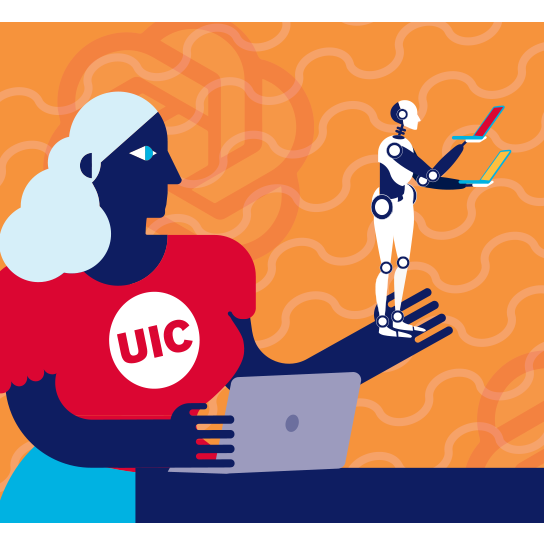An Update on UIC’s Journey with AI Adoption
quote Heading link
As UIC continued integrating AI, transparency became a priority. AI advising groups were established to develop policies and best practices, ensuring that the use of AI aligns with UIC’s commitment to equity, inclusivity, and responsible innovation.
text Heading link

The University of Illinois Chicago (UIC) began its journey with AI in the fall of 2023 during the provost’s retreat. A panel of AI adopters and advocates highlighted the positive potential of AI. Still, the discussion raised questions from faculty and administrators about academic integrity, job displacement, and the overall trustworthiness of AI technologies. These concerns underscored the need for a thoughtful and measured approach as UIC moved forward with AI adoption.
Reflecting on the Kubler-Ross Change Curve, it became evident that UIC was in the early stages of embracing AI. Leading this change required strategic communication, active listening, and establishing a sense of stability within the university community.
LTS Strategic Initiative: Inspire Learning
To bridge the gap between faculty concerns and AI’s potential, LTS focused on UIC’s “Inspire Learning” initiative, which aims to modernize and sustain the university’s digital learning infrastructure. This initiative empowers instructors to utilize educational technologies, support multi-modal instruction, foster scholarly teaching, and promote cross-disciplinary collaboration, all while meeting students where they are.
This vision has facilitated the adoption of emerging technologies in the past and continues to guide our approach to AI integration. By leveraging existing partnerships and focusing on improving the efficiency of administrative functions, content development, and equity across disciplines, UIC is committed to fostering a culture of continuous improvement and exploration. With this framework, we can promote AI literacy through teaching and learning technologies while relying on trusted partners to navigate the adoption process cost-effectively.
Collaborative Efforts in AI Adoption
LTS engaged with our vendors, who were already developing AI tools to build trust and ensure smooth integration. Trusted by faculty, these vendors became crucial allies as we introduced AI through workshops, newsletters, and editorials that provided balanced views of AI’s pros and cons. Collaboration was key to this rollout—faculty, staff, and stakeholders played integral roles at every stage.
UIC’s ITLC Governance Committees, our Change Advisory Board (CAB), Security and Privacy, and Digital Accessibility evaluated AI tools before launching, piloting, or adopting them. These assessments ensured the tools aligned with UIC’s values and the community’s needs and met our security and compliance standards. This collaborative and transparent approach reassured faculty that AI tools were being integrated in ways that enhanced UIC’s educational goals.
Faculty and Staff Workshops
One key realization LTS made early on was that providing AI tools was insufficient; faculty needed personalized training and opportunities to explore these technologies. UIC responded by expanding and tailoring its workshop offerings, reflecting an increased demand from departments eager to explore generative AI applications.
Examples include:
- The College of Dentistry and Pharmacy held prompt-based workshops to develop case studies.
- The Nursing and Business departments requested insights into the AI Design Assistant.
- Public Health and Sports Administration explored AI tools like Grammarly and Microsoft Co-Pilot for writing assistance and customized workout schedules.
These workshops helped faculty build confidence in AI tools, fostering greater engagement and innovation in how these technologies could enhance teaching and learning.
UIC AI Advising Groups and Ethical Considerations
As UIC continued integrating AI, transparency became a priority. AI advising groups were established to develop policies and best practices, ensuring that the use of AI aligns with UIC’s commitment to equity, inclusivity, and responsible innovation. These groups focused on critical issues such as data privacy, security, and algorithmic bias.
One significant project the Teaching and Learning AI Advisory group worked on is a rubric to guide AI tool adoption across departments. This rubric helps faculty assess whether an AI tool is safe, effective, and aligns with UIC’s educational goals. The advising groups also addressed concerns regarding job displacement, resource investment, and policy follow-through. By gathering input from faculty, staff, and students, the AI advising groups are shaping UIC’s future in a way that balances innovation with responsibility.
Application of Ethical Standards
UIC’s AI adoption process has emphasized ethical considerations concerning data privacy and algorithmic fairness. As AI systems that handle sensitive data increase, safeguarding against breaches and biases is paramount. These concerns are central to discussions as UIC continues to refine its AI use policies and practices.
For example, Grammarly, one of the AI tools piloted at UIC, has already shown positive results. With nearly 15,000 users after nine months, the tool creates equity as a writing resource by offering free access to all faculty, staff, and students. A recent survey conducted in spring 2023 indicated overwhelmingly positive feedback and a new survey has been launched. UIC is also exploring a Business Associate Agreement (BAA) with Grammarly to expand its use in the medical school, and we are considering extending the pilot to a second year to collect more data.
However, before fully adopting tools like Grammarly, UIC must consider the pedagogical implications. Collecting both positive and negative use cases and examining their impact is critical in determining whether this application fits our school. I am encouraging faculty to provide feedback through surveys or direct discussions with my staff and me. Faculty input is essential to ensure these tools enhance UIC’s educational mission.
Looking Ahead
UIC’s journey with AI is ongoing, and the university remains committed to a collaborative and ethical approach to AI adoption. By building trust, fostering AI literacy, and addressing ethical concerns, UIC positions itself as a leader in integrating AI into higher education while staying true to its core values of equity, inclusivity, and innovation.